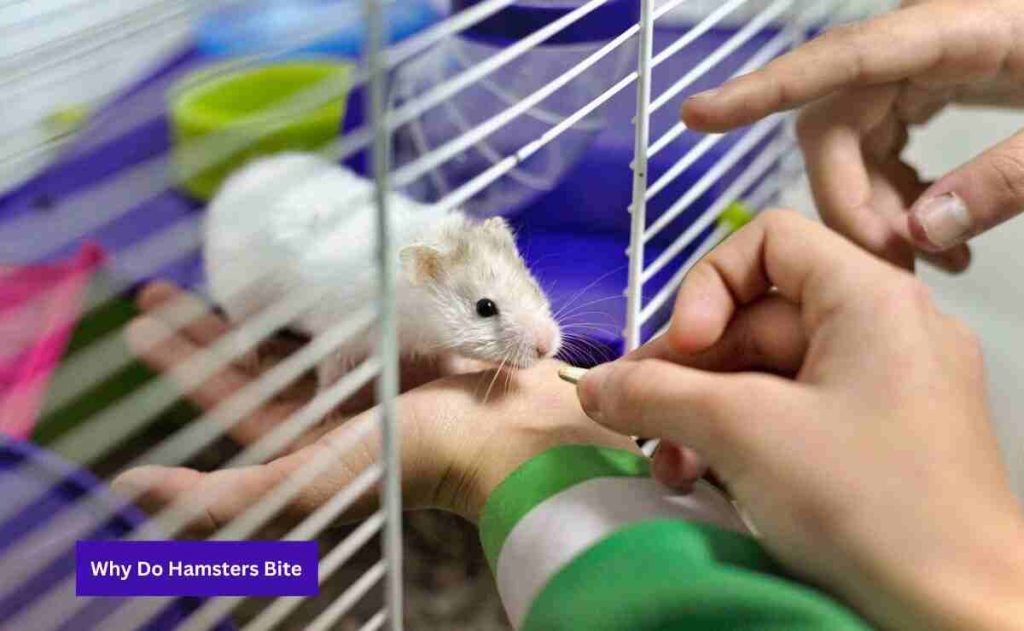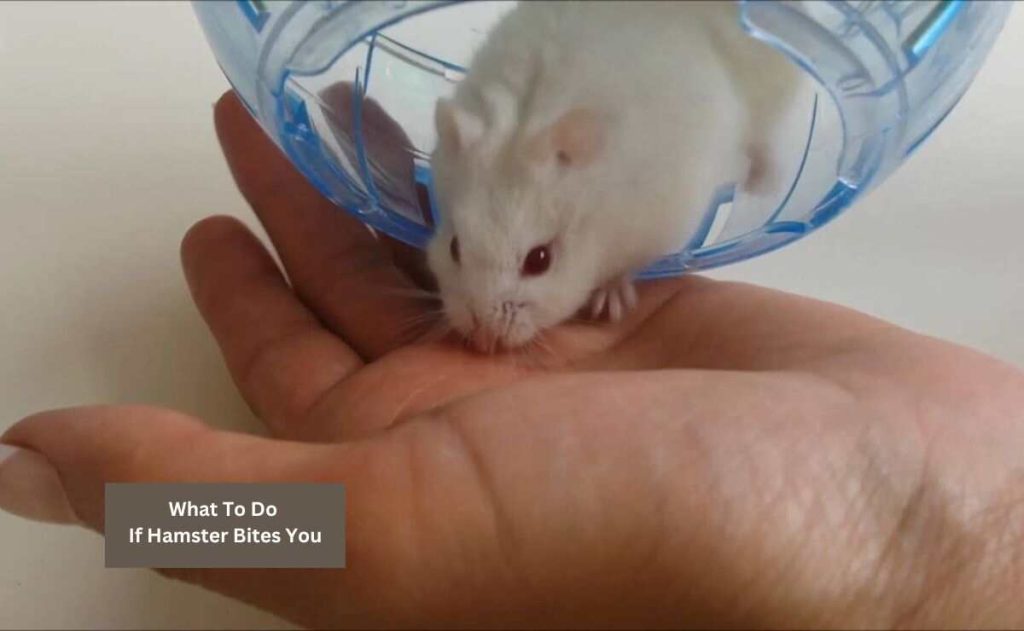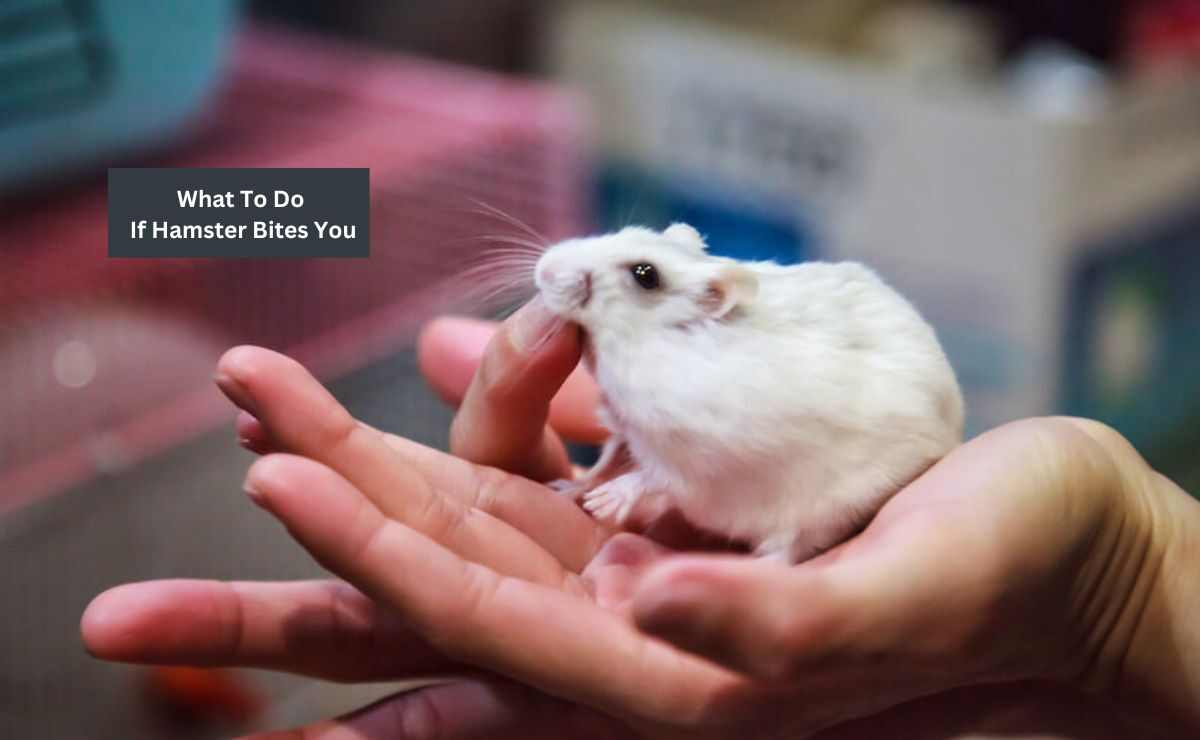If you are an owner of a cute, little hamster, we envy you. These little buddies can be very fun to be around until they bite!
Don’t be surprised, hamsters can bite you at times. But what to do if hamster bites you?
First, respond calmly. After that, look at the bite to see whether there’s any damage. The antiseptic ointment should be used after the wound has been cleaned with mild soap and water. Seek medical assistance if the bite is serious or causes bleeding.
There are certain things to know when your hamster has bitten you. Let’s move forward and focus on that!
Why Do Hamsters Bite?

Depending on the circumstances, hamsters may bite; learning why they do so might assist you in avoiding getting bitten. Some of the most general causes of hamster bites are as follows:
- Fear: Hamsters are tiny, vulnerable animals. So they are quickly frightened or stressed out. Sometimes they get suddenly hyper too. If they see new people, or just adjusting to the environment, the fear may get heightened. As a result, they might bite in self-defense in response to sudden, loud noises, quick movements, or rough handling.
- Explore To Vulnerability: If your hamster feels vulnerable in an environment, they might express fear or stress through biting. As a result, in any kind of unusual circumstance, they feel threatened and choose to bite as a defensive mechanism.
- Injury: Hamsters may bite in defense if they are injured or sick. They might seek attention through biting, and let you know that they need special care.
- Protecting Territory: Hamsters are territorial creatures like cats and dogs. When they feel like you are invading their territory, they might attack by biting you. Especially if they are not accustomed to your presence or scent, they may resort to biting.
- Lack Of Trust: Hamsters like to stay alone. If you just brought your hamster home, it will take some time to get to know you. Until they trust you entirely, they are more likely to bite.
- Mating Behavior: When it comes time to mate, male hamsters, or even Syrian hamsters, might show aggressive behavior. If they take your hand for that of a competitor male or you approach them while they are in a breeding state of mind, they may bite.
What To Do If Hamster Bites You?

If your hamster bites you, it can be due to one of the reasons we have stated above. Here are a few things to do in such a case:
- Don’t freak out: First, your hamster probably bit you out of curiosity or terror. So, don’t move your hands abruptly or heighten the fear. Instead, slowly try to remove your hands from the cage.
- Remove Your Hands: Remove your hand slowly and cautiously from the hamster’s cage. Don’t make any erratic or abrupt motions, as it will further make your hamster defensive.
- Check The Area: Check for signs of blood or damaged skin near the bite. To avoid infection after a skin puncture, wash the area with antiseptic soap and water.
- Consult A Doctor: If the bite seems serious, consult a doctor. They might prescribe you medications depending on the injury.
How Long Does It Take A Hamster To Get Used To You?
The time it takes for a hamster to get used to you mostly depends on the animal itself. It may take a few weeks to a few months for this to happen.
An important factor is the hamster’s age and how much familiarity it has had with humans in the past. Hamsters that have been handled when they were young are more likely to be friendly and adapt rapidly.
Naturally friendly and inquisitive hamsters may also bond with their owners more quickly. However, cautious hamsters can need more time and patience to warm up to new people.
Diseases Concerning Hamster Bites
Hamster bites may cause diseases as they transfer germs to the wound. Some of the common diseases that you might face are:
- Infections
- Tetanus
- Cellulitis
- Lymphocytic Choriomeningitis Virus (LCMV)
How To Stop A Hamster From Biting?
Preventing your hamster from biting is critical for both of your sakes. The first step in solving the biting problem is to have an understanding of hamster behavior.
Hamsters often bite when they are stressed, scared, or feel threatened. By being aware of these flashpoints, you may approach the situation with more compassion and tolerance.
Second, introduce yourself to your hamster slowly so that it can become used to seeing you about the house. Talk sweetly to it and feed it snacks through the bars of its cage. Gradually, you can give your hand inside the cage without really touching your hamster.
Pay close attention to your hamster’s body language and remember to respect its boundaries. Give it some space if it shows indications of anxiety or tension like raised fur, hissing, or withdrawing.
Building trust with your hamster is a process that takes time and consistency. Make sure your hamster isn’t disturbed by any loud noises or quick movements. Also, gently touching or stroking them as trust develops is a good next step.
Frequently Asked Questions (FAQs)
Can a hamster bite be harmful?
It can be harmful sometimes as it can contain bacteria. Although not generally life-threatening, every wound has to be cleaned and treated to avoid complications.
How long do hamster bites take to heal?
Hamster bite recovery time depends on the condition of the injury. Bites that aren’t too severe usually heal in a few days, but more severe wounds or infections might take up to a week or more.
Can you get tetanus from a hamster bite?
Hamster bites and other puncture wounds provide a small amount of tetanus. If the bite is deep or puncture-like, you should make sure your tetanus shot is up to date.
Do I need injection after hamster bite?
If your wound is severe and it’s bleeding, then you might need medical attention. Therefore, they will suggest whether you need an injection or not.
Final Words
By now, you are already aware of what to do if hamster bites you.
If you just brought a furry friend home, it’s better to take time to get it used to you. After a few days, it won’t feel threatened, and the biting issue will be gone.
